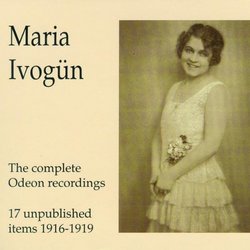| All Artists: Wolfgang Amadeus Mozart, Vincenzo Bellini, Giuseppe Verdi, Gioachino Rossini, Gaetano Donizetti, Johann II [Junior] Strauss, Eva Dell'Acqua, Frederic Chopin, Peter Cornelius, Georges Bizet, Giacomo Puccini, Giacomo Meyerbeer, Otto Nicolai, Maria Ivogün, Karl Erb Title: The Complete Odeon Recordings Members Wishing: 0 Total Copies: 0 Label: Preiser Records Release Date: 6/26/2001 Genres: Pop, Classical Styles: Vocal Pop, Opera & Classical Vocal, Historical Periods, Classical (c.1770-1830) Number of Discs: 2 SwapaCD Credits: 2 UPC: 717281892377 |
Search - Wolfgang Amadeus Mozart, Vincenzo Bellini, Giuseppe Verdi :: The Complete Odeon Recordings
 | Wolfgang Amadeus Mozart, Vincenzo Bellini, Giuseppe Verdi The Complete Odeon Recordings Genres: Pop, Classical |
Larger Image |
CD Details |
CD ReviewsEarly, Exceedingly Rare Recordings of the Delightful Ivogun Doug - Haydn Fan | California | 12/18/2008 (5 out of 5 stars) "Peiser here gives us lucky 21st century opera lovers a chance to hear pristine examples of acoustic recordings made by one of the most beloved singers of the last century. These recordings, many of them unpublished test pressings, are the earliest examples of singing we have from the supremely gifted Hungarian soprano Maria Ivogun. A sensation from her earliest childhood, Maria was the daughter of a gifted mother who sang opera and operetta, and these recordings catch her at the beginning of her career.
These Odeon recordings were made while Ivogun was singing under Bruno Walter in Munich. Walter heard her as a very young beginner in her first try-outs in Vienna, and when the Vienna did not pick her up, the lucky Walter grabbed her for his own opera house in Munich. She stayed there from 1913 through 1925, singing not only coloratura roles, but also some of the lyric repetoire, leaving with Walter when he took up a new post at the Berlin State Opera. There Ivogun reached the height of her fame, becoming one of the toasts of Berlin's glorious pre-Nazi cultural boom. Like the American soprano, Geraldine Farrar, Ivogun kept her early promise to retire from the stage at a reasonable age; her name is most remembered today for Ivogun's famous students, such as Elizabeth Scwarzkopf. This set can be confusing - there are many duplications of the same items, as can be seen through the listings. Essentially Preiser has put together as much as they could, and we are left to take it as extra goodies. Many of these are unpublished, but in many cases there is no clear cut expanation for why one cut was chosen over another. In the end, we have Ivogun in her youthful fresh voice singing as only she can sing - and as such I am perfectly happy to hear her sing the same aria twice in 1916, or retry it again in 1917 or 1919. For others this might seem gilding the lilly. I call it an embarassment of riches. Few singers of this (or any) period offer as balanced and attractive a musical identity as Ivogun. Lively, but never a soubrette, serious, but never heavy, Ivogun brought to opera and lieder a pure delight in what she could do, all turned into glorious song. The closest comparison from this era to Ivogun might be Galli-Curci, but the Italian prima donna is a bit more 19th century in her delivery, more songful in the suggestion of pathos and melodrama. Ivogun as a singer is a bit brighter in tone, and less given to melodramatics. Like her mother before her, Ivogun always suggests she has one toe in the special world of operetta. For lovers of great singers, this is a wonderful indulgence, and one that will fall readily to hand whenever you play any number of arias. Ivogun's voice always floats into your head whenever certain pieces are heard." |
